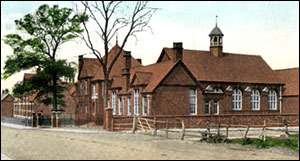|
|||
| G. E. Bayes, Northamptonshire & Bedfordshire Life April 1976 |
|||
|
Rushden's Sunday School Treats |
|||
|
|
|||
|
Busy mornings of preparation and early dinners were the rule on "Tea-drinking Day". Early in the afternoon swarms of children from every corner of the town would be making their way to the field off Higham Road where the great procession formed up. All would be dressed in their best, each carrying cup and saucer tied in a handkerchief, or a mug strung round the neck. Each school formed up under its own distinctive sign, with teachers conveniently integrated to maintain order in the column. After a brief prayer and the singing of a hymn, the great procession began to move off. Each school had its gleaming banner supported by poles and guide-ropes which the bearers found difficult to manage even in the gentlest breeze. The town's four brass bands were strategically spaced in the mile-long column so that all could march to the stirring tunes played. [ for more on the Bands see the Leisure section] Everybody would be out to witness this great spectacle. The High Street shops were dressed overall with flags and bunting, pavements were deeply lined with spectators and crowds of heads peered from upstair windows and balconies. With shops closed, Mr. Robert Hooper's donkey-drawn icecream cart did a roaring trade. Earlier in the day, the town water-cart had toured the processional route to lay the dust, but nothing short of a cloudburst would cause the parade to be abandoned. Following the legions on foot came mobile divisions of tiny tots from all the schools, riding on horse-drawn coal carts and farm wagons, cleansed and decorated for the occasion. In contrast, and at the very end, were the bonnetted and bearded veterans riding in brakes and wagonettes, re-living the thrills of their own childhood days.
Gate-crashing prevented Immediately following tea, the children would proceed to their respective playing-fields, joined later by the adults. A popular venue for the Baptists was Mr. Jerry Knight's field in Wymington Road, being easy of access to the town and with plenty of room for races, organised games, and for the crowds to mill around in congenial spirit. As a precaution against gate-crashing, each scholar received a special ticket with tear-off portions entitling the holder to regulated attractions, chief among which were the swings, erected beforehand. Organised sessions of "tig" and "stag" were stimulating aids to the party spirit. Soon the Temperance Band would take up their positions and discourse pleasant tunes at intervals. The main attractions were the races in which there was no lack of competitors. Girls and boys had their separate events with handicaps for age and prowess, featuring flat, egg and spoon, three-legged, potato, obstacle, skipping, and sack races. Few runners possessed special gear; generally they ran, jackets off, in stockinged feet. In order not to infringe the amateur status of winners, voucher prizes were awarded that could be spent at such local emporiums as Cartwright's, Snelson's, Croft & Nichols or at the Co-op. As spending money was limited, the presence of a greengrocer's cart selling early summer fruits—mainly cherries—was adequate for the demand. In the early days of refrigeration, ice-cream was not a good outdoor line in hot weather. Other diversions, popular to the adults, were the brake-rides "as far as the mill and back" and to the Bedfordshire border. Mr. Asher Abbott did brisk business in this two-counties tourist traffic. As the evening wore on and that full feeling wore off, there came the moment for a traditional high-spot of the proceedings—the distribution of buns. The arrival of the cart bringing its inflated cargo was a signal for all to surge forward to the distribution point, where upon the surrender of the appropriate voucher, each scholar was regaled with a bun. The struggling and jostling occasioned gave rise to the term "bun-fight" by which these field-days were known. Sometimes a tune in waltz-time by the band would tempt a few of the bolder folk to indulge in a little dancing, provided of course, most of the older folk had gone home. There was also opportunity for a little romance, and many life's partners were found at these tea-drinkings. The grand climax came with approaching twilight; the releasing of the fire balloons. Scientifically-minded teachers were entrusted with the sacred task of checking for wind direction, and then filling the large bags with the propellant substance, the heat from which when ignited would cause the balloon to rise and float down wind. Great was the wonder evoked at the release of these ballistic mysteries. Every eye was turned skywards and when the last balloon was out of sight, all knew that another tea-drinking was over and it would be "back to school and work tomorrow". Note: George Bayes, the author of this also wrote a book, in 1951, "These Years Have Told" about the history of the Baptist Church. Please has anyone got pictures from a tea party?
|
|||
